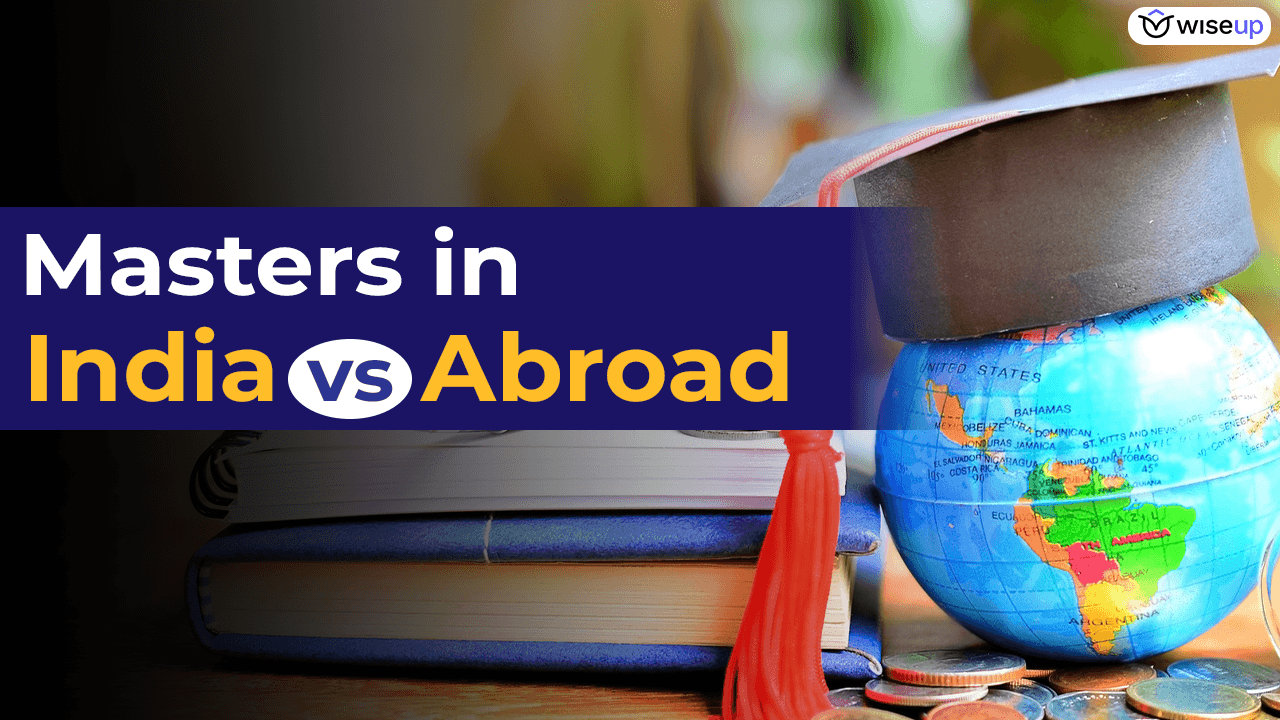Cost of Education
For many students, cost plays a pivotal role in deciding whether to study in India or abroad. The financial burden of tuition fees and living expenses can differ drastically between the two options.

India:
The cost of education is significantly lower, especially in top institutes like IITs, where MTech tuition fees can range around ₹2 lakhs.
Living expenses depend on the city, but they are still relatively affordable.
Abroad:
Studying abroad comes with higher tuition fees, starting from ₹15 lakhs and going up to ₹30 lakhs or more. In addition, living expenses can add another ₹4-5 lakhs annually.
However, scholarships are abundant and can greatly reduce these costs. Countries like Germany offer near-free education, and other countries have assistantships and financial aid to help mitigate expenses.
You can have a look at the comparison table shown below to get a clear picture about the tuition fees, living expenses, scholarships and other costs involved.
| Parameter | Masters in India | Masters Abroad |
|---|---|---|
| Tuition Fees | ₹2 lakhs (for IITs and other top institutes) | ₹15–30 lakhs or more |
| Living Expenses | ₹1–2 lakhs annually (depends on city) | ₹4–5 lakhs annually (varies by country) |
| Scholarships | Limited, but available in premier institutes | Widely available; can significantly reduce costs (e.g., Germany offers near-free education) |
| Other Costs | Books, hostel fees (~₹50,000–₹1 lakh annually) | Health insurance, visa fees, flights |
| Financial Aid Options | Loans available, less international exposure | Scholarships, assistantships, loans |
Key Takeaway: While the cost of studying abroad is higher, scholarships and financial aid can reduce the burden. In contrast, studying in India is more cost-effective, particularly in top institutions.
Job Opportunities
One of the most compelling reasons to study abroad is the promise of better job opportunities. However, the job market can vary depending on the country, university, and field of study.
India:
Indian graduates from top institutes like IITs and IIMs also have access to fantastic job prospects, especially in sectors like IT, business, and management.
However, the job market is more competitive, and salaries may not be as high as those offered abroad.
Abroad:
Students in fields like Computer Science, Business, and Engineering often find better job opportunities abroad, particularly in countries like the U.S., Germany, and Canada. Silicon Valley, for example, offers some of the best-paying jobs for tech graduates.
Below is a comparison table that shows the field-wise job prospects.
| Field/Domain | Masters in India | Masters Abroad |
|---|---|---|
| Tech (e.g., CS, IT) | Excellent opportunities, especially with top institutes like IITs | U.S., Canada, and Europe offer better-paying opportunities in tech, especially in Silicon Valley |
| Core Engineering | Limited opportunities, but good scope in industries like Manufacturing | Germany, Sweden, and other European countries offer strong job prospects in mechanical, civil, and chemical engineering |
| Business/Management | Rapidly growing opportunities with global firms, especially from IIMs | Excellent opportunities at top international firms (e.g., Goldman Sachs, McKinsey) |
| Medical/Health | Limited scope, especially for international recognition | High demand in countries like the U.S., UK, Canada, Australia |
| Arts/Design | Good scope in India with growing creative sectors | Expanding opportunities abroad, especially in the U.S. and Europe |
Key Takeaway: While job opportunities are available both in India and abroad, international students may find better-paying and more diverse opportunities in fields like tech and business abroad.
Education Standards
The quality of education is another key factor. While both India and abroad offer high-quality programs, the experience can differ depending on the type of program and location.
To learn more, check out the video below:
India: For coursework-based programs, top Indian universities provide quality education comparable to international standards. However, research opportunities may be limited, and the global exposure is often not as vast as it would be in foreign institutions.
Abroad: International universities offer superior research facilities and funding. Many programs abroad are research-oriented and allow students to work closely with global experts. Classroom interactions tend to be more diverse, with students from various backgrounds.
A summary is shown below:
| Parameter | Masters in India | Masters Abroad |
|---|---|---|
| Coursework-Based | Good quality, especially in top institutes | Similar quality, with global exposure and better resources |
| Research Opportunities | Limited in some fields, growing focus in top institutes | Excellent facilities, funding, and global experts in various fields |
| Classroom Experience | Comparable in top institutes like IITs | May offer more interactive, global exposure |
| Global Recognition | Increasing, especially from top institutes | Widely recognized globally, especially from prestigious universities |
Key Takeaway: If you are looking for a research-based program, studying abroad offers better facilities and global exposure. For coursework-based degrees, top Indian universities like IITs provide high-quality education.
Work Culture
The work culture can significantly impact your overall work-life balance and professional growth. It varies greatly between India and abroad.

India:
In India, work culture can be more demanding, with longer hours and expectations of significant work input.
IT and tech professionals, for instance, often find themselves in backend roles. However, promotions and salary increments can be slower, especially in entry-level positions.
Abroad:
Work culture abroad typically offers better work-life balance, especially in European countries and North America, with a standard 40–45 hour work week.
Employees are often compensated for overtime, and work roles in fields like tech tend to offer more front-end, impactful positions.
A summary is shown in the below table:
| Parameter | Masters in India | Masters Abroad |
|---|---|---|
| Work Hours | Often exceed 50 hrs/week | Typically 40–45 hrs/week, with overtime compensated |
| Work Quality | More backend roles, especially in IT/Tech | Front-end roles in tech, with higher autonomy |
| Work-Life Balance | Often challenging, with long work hours | Generally better work-life balance, more structured work hours |
| Job Security | Generally stable, but promotions can be slow | Dependent on visa status, potential bias towards other nationalities |
| Benefits | Limited in certain industries | More comprehensive, including health insurance, overtime pay |
Key Takeaway: Abroad generally offers better work-life balance and higher compensation for overtime, while India may involve longer work hours and slower career progression.
Life After a Master’s Degree
The life you envision after completing your master’s—whether staying abroad or returning to India—can influence your decision.
India:
Returning to India with an international degree can offer career opportunities, but the salary and work environment may not match the higher-paying jobs abroad. You will benefit from being close to family and familiar surroundings, which may outweigh financial considerations for some.
Abroad:
Staying abroad offers higher salaries, especially in fields like technology and business. You will also experience a new lifestyle, with exposure to different cultures. However, you may have to deal with visa restrictions, and job security may be less certain.
The various factors are summarised below in a tabular format for easy reference.
| Aspect | Staying Abroad | Returning to India |
|---|---|---|
| Standard of Living | Higher, especially in Western countries | May be lower depending on job position and location |
| Salary Comparison | Higher salaries, especially in tech and business | Similar to local graduate salaries, unless from a top university |
| Career Opportunities | Excellent international exposure, better opportunities in global firms | Opportunities available, but may not match international salaries |
| Cultural Experience | Exposure to diverse cultures, new lifestyle | Familiar environment, proximity to family and roots |
Key Takeaway: Staying abroad offers higher salaries and global exposure but comes with potential visa and job security challenges. Returning to India provides comfort and familiarity but might result in lower salaries.
To get some help on getting a job abroad, check out the video below:
Conclusion: So, What Should You Choose?
Choosing between studying in India and abroad ultimately depends on your personal goals, career aspirations, and financial situation. Here’s a quick summary of when to choose each option:
Choose Masters in India if:
You prefer to stay close to family and want a more affordable education.
You want guaranteed placements from top institutes like IITs and IIMs.
Choose Masters Abroad if:
You want international exposure, cutting-edge research, and a better work-life balance.
You are comfortable with the higher costs and challenges associated with living abroad.
Both options offer distinct advantages and challenges, but it ultimately comes down to what suits your needs and aspirations.
If you need help with your study abroad applications, then do check out our course – Write your Way to Study Abroad
Weigh the factors carefully, and make an informed decision based on your career goals. Wishing you the best of luck on your educational journey! Feel free to share any questions or insights in the comments below.





